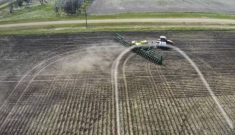No matter what your age, or the ages of your family members, it seems there’s good reason to start paying yourself (and them) a wage, especially if you back it up with a well-structured system of bonuses.
Farm financial advisers across the country report that more farmers are making the switch away from simply dividing the commodity cheques after all the expenses and the mortgage has been paid, and they’re doing it for more reasons
Mostly, it’s because it takes more than waking up early, working hard, and getting a helping hand from Mother Nature to build a successful farm these days. It takes business strength too. And a farm that pays wages has more chances to get strong, and stay there.
Read Also

How scientists are using DNA and climate data to breed crops of the future
A method for forecasting how crops will perform in different environments so that plant breeders can quickly select the best parents for new, climate-resilient varieties.
Until recently, if you paid yourself a farm wage, it almost certainly meant you’re a corporate farmer. And today, while other farm types are also quickly adopting pay and bonus strategies, wages are still a key part of farm corporate thinking.
Rising commodity prices have put many grain farmers in higher earnings brackets in the last few years, which means that incorporation can help them at tax time, says Dave Beckie, director of agricultural client services with Endeavor Chartered Accountants in Hanna, Alta.
The difference in your tax bill can be staggering. For instance, Alberta’s highest personal tax bracket — for those earning over $126,000 — is 39 per cent, whereas the corporate rate is 14 per cent.
Beckie recommends most of his corporate clients take a regular salary to keep them in a lower tax bracket while building their Canada Pension Plan (CPP), and then issue dividends at the end of the year for any extra personal income they may need.
“What we suggest for some of our clients out here in Alberta is something like $3,000 a month salary, gross,” says Beckie. “Then when we do up their yearend for the company, if there are any withdrawals over and above that, we’ll usually issue dividends — dividends are taxed at a lower rate than T-4 income — and that way, it gives them a steady stream of income throughout the year.”
By contrast, a sole proprietor who takes out no wage and simply reports his total income earned on the farm on his tax return has his CPP calculated off that amount. If total earnings are a loss and no income was generated, then there’s no CPP paid.
Not just incorporated farms
Beckie believes the newer generation of farmers wants a steady paycheque and stability instead of the feast or famine cash flow that their parents and grandparents managed to get by on.
“In the past, farmers would just slug it out because they liked the lifestyle, they enjoyed the farming, and hoped for that payday somewhere down the road,” Beckie says.
The new generation is just as dedicated, but they have worked off farm and they want similar results when they return, Beckie says. “They compare the farm to another business and say, ‘My buddy owns a Tim Hortons, and he’s getting $5,000 a month, so why can’t my farm pay me some compensation throughout the year?’”
Farm managers should set themselves a target of what they want to accomplish. Then, like other businesses, they can declare bonuses by year end, says farm business consultant Larry Morin of Fort Saskatchewan, Alta.
Morin says farmers might want to earmark 25 per cent of profits as bonuses, and use that money for, say, vacations, and as a way to reward themselves and their families for doing a good job of running the farm business. That in turn gives them a sense of accomplishment.
A parent wishing to bring the next generation into the farm’s ownership can also make good use of bonuses, says Len Davies of Davies Legacy Planning Group in Muirkirk, Ont.
A son, for example, could come to his parents with a business plan in which he sets a specific list of benchmarks that need to be accomplished in order to achieve certain objectives. The plan defines not only what must be accomplished, but it also defines who is responsible and who is the backup, and it includes start and completion dates.
On the basis of those objectives, bonuses are handed out, Davies says.
“You’ve got to tie it to something that you can identify, like key financial ratios,” says Davies, who has worked with Ontario farmers on financial issues for more than 35 years. “If you list the activities and the jobs, that’s identifiable. If you link it to profit, well, you could do a real good job but it’s not your fault if the prices are bad or if it happens to be a drought year… it’s got to be something the son can control. Otherwise he’ll get discouraged after a while if he doesn’t get paid because of circumstances beyond his control.”
The son’s plans and budgets can also serve as a testing ground, helping prepare him for when he runs the operation himself.
“Parents want to develop the successor’s management skills,” says Davies. Before they transfer ownership, of course, they also want to know if the son is actually up to the job. In farming today, that isn’t a simple thing — for either generation.
But there’s another consideration too for the older generation.
Parents can receive their own bonus money and use some of it to diversify their investments, which can also aid the succession transition.
“What we find, especially in the succession planning process, is that Mom and Dad haven’t allocated any assets for their own retirement,” says Morin. “So all of a sudden they’re 65 years old, they have a net worth of $3 million. But they have a son who wants to take over the farm, and their net worth is comprised of land, buildings, equipment, cattle, inventory, etc.”
If the parents want $1 million to retire, their son may find it impossible to borrow such an amount while still keeping the farm viable, Morin explains.
But if part of their net worth is accumulated outside the farm in an investment portfolio, when the parents retire, they can give farm assets to their kids and keep their cash assets, leaving no financial hardship on either side or tough decisions.
The transition from lifestyle to business
Often, farmers may not really know if they’re profitable or not, in part because living costs can be hard to separate from farm expenses.
“Also what happens when everything is muddled together is that revenue earned goes back to the farming operation, which leaves the family without a clear understanding of whether the business is actually making money or not,” says Morin.
Only by creating separate bank accounts, and taking out a weekly or monthly draw from the farm account and depositing it into the family living account, can farmers determine their cost of living, and the profitability — or lack thereof — of their farming operations, Morin says.
Morin has seen many unprofitable operations over the last decade, but the owners weren’t aware of that because they were just tapping into their equity, of which there’s an awful lot in agriculture.
“But you don’t really feel the pain,” Morin says, “until the banker finally says, ‘No, we’re not going to give you any more operating money.’”
Lenders and investors alike are becoming more stringent when it comes to record-keeping, he adds.
Some banks are even giving farmers preferential rates when they come armed with well detailed business marketing plans, says Mark Lepp, co-founder and business manager of the advisory service FarmLink Marketing Solutions in Winnipeg, Man.
“That’s exactly what the banks look for: details a farmer can provide on their costs, on their cash flow, on their profitability projections, a best case/ worse case scenario… I haven’t seen specific examples where the bank tells the farmer, ‘You need to have a plan like this done,’ but I don’t think they’re too far away,” Lepp says. “And the farms that have it done already are just more professionally run, and I’ve been told they get better rates.”
Some farmers looking to expand have tapped investment groups who buy land and lease farms to growers. For instance, a fund out of Ontario buying land in a joint venture with a farm manager will certainly require a good deal of planning and documentation, not to mention good accounting, Lepp says.
“We definitely see a trend toward more business planning, more structure… I think that the next five to 10-year trend will be that there’s more and more requirements both from a financial side, whether it’s traditional banks or outside sources of money,” says Lepp. “I think it’s good. The farms will be more profitable by just knowing where they’re at, where they want to be, and how they’re going to get there.”
According to Lepp, two-thirds of his firm’s clients are under 50 and are treating the farm more as a business than a lifestyle.
How does he know they’ve become a business?
Says Lepp: “That transition from a lifestyle to a business is where they start taking out a flat fee and treat it like they’re a manager.”CG
———
“ You’ve got to tie it to something that you can identify, like key financial ratios.”
— Len Davies
———
“ That transition from a lifestyle to a business is where they start taking out a flat fee.”
— Mark Lepp















